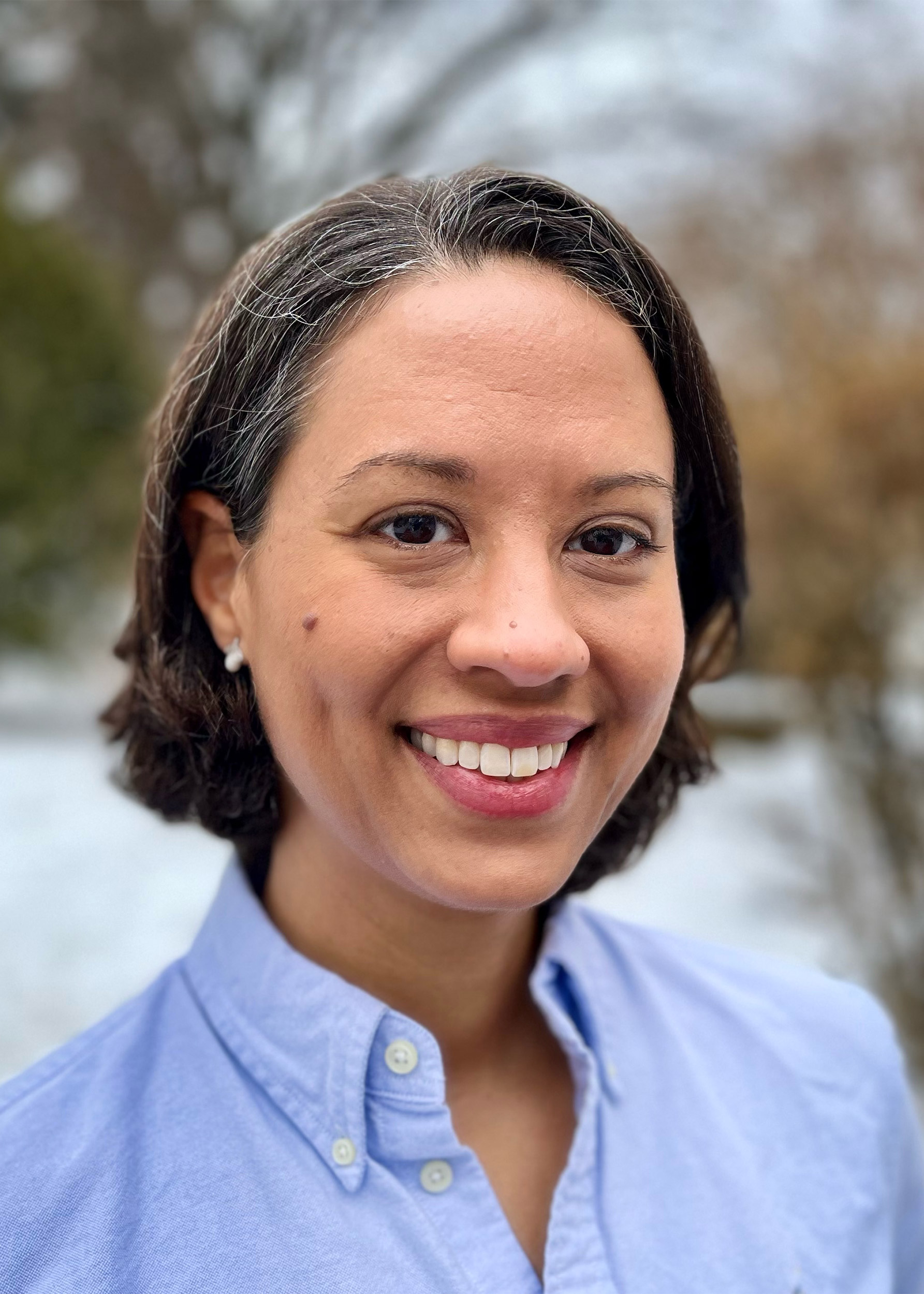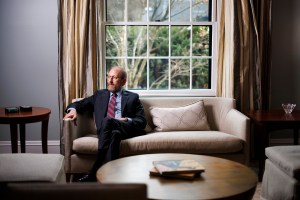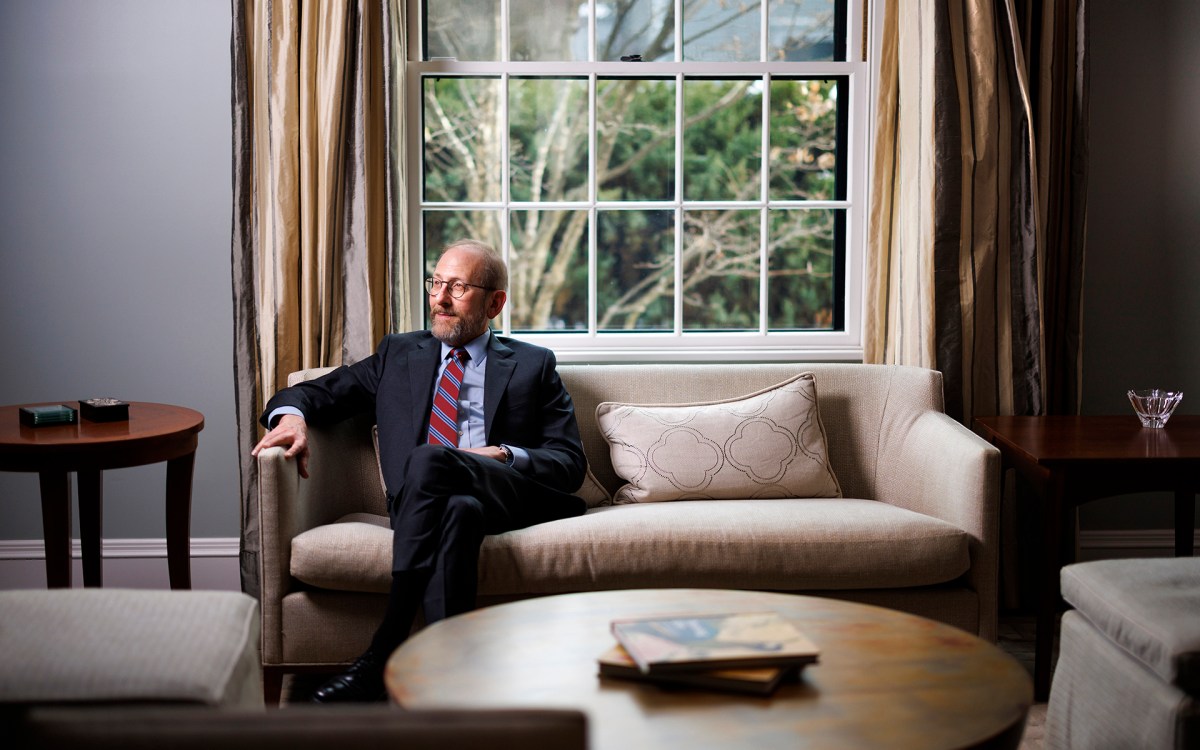Extension School grad returns as program director
Lindi von Mutius, A.L.M. ’05, to head up School’s sustainability programs

“This new role allows me to give back to a program that helped shape my professional career,” says Lindi von Mutius.
Photo courtesy of Lindi von Mutius
For years, Lindi von Mutius has had a passion for the environment and global sustainability. After graduating in 2005 as Harvard Extension’s first master’s degree candidate in the Environmental Management program, von Mutius took what she learned and turned her passion into action. She has held senior roles with the World Bank, Association for the Protection of the Environment in Cairo, German Ministry of Economics and Energy in D.C., Environmental Defense Fund, Sierra Club, and Trust for Public Land. On Feb. 1, von Mutius returned to the Extension School as its director for the Sustainability and Global Development Practice programs.
Von Mutius spoke with the Gazette about her vision for the HES program, the challenges we face on climate change, and how global leaders can pivot to working together and establishing better environmental policy for the planet. The interview has been edited for clarity and length.
Q&A
Lindi von Mutius
GAZETTE: What is your vision for the Sustainability Program as its new director?
VON MUTIUS: This new role allows me to give back to a program that helped shape my professional career. I still have very fond memories of the courses I took 16 years ago as a student, and how those courses opened my eyes and challenged me to think more critically about environmental issues. Our programs excel at this. I want to continue that legacy in this rapidly evolving field so that our students are challenged to think about problems and solutions with fresh eyes, question their own assumptions and biases, ask who is missing from the conversation, and have the skills to research, map, and imagine better solutions.
I’d also like to focus on enhancing the student and faculty experience. The people in our program come to our courses with an incredible diversity of thought, reside on every continent (yes, even Antarctica), and have decades of practical expertise in their fields. I will really be thinking about strategies to create a program culture where more of that expertise is shared, and where both students and faculty feel they are part of a vibrant, inquisitive community of thought leaders — even when we’re all sitting together on Zoom.
There are also three ways that I’d like to see the program grow:
- I’d like us to offer a more robust set of courses on climate change and adaptation. The communities and companies that our students live and work in will all face unique and varied challenges as the impacts from anthropogenic climate change intensify. I would like to see our students prepared to tackle these challenges.
- In 2018, when I first reached out to Mark Leighton [senior adviser in the Sustainability and Environmental Management Program at Harvard] and former Sustainability Program Director Tom Gloria about teaching a class on environmental justice, it was partially driven by my own work and passion in the field, but also by a recognition that this was missing from the program. I appreciate how both of them and the Harvard Extension School Environmental Club have increased that focus on course offerings and events. But we can do much more, as sustainability experts grapple with how to make positive change in a world with significant, historical, inequality.
- Finally, I’d like to see the program prepare students to work with communities, cities, and local governments. If you think about the fact that a handful of U.S. states emit as much carbon as Germany, you recognize that these states also have the ability to become significant leaders in mitigating climate change and pollution. We need to ensure that our students know how to work with a range of stakeholders and are compelling advocates for sustainable solutions.
GAZETTE: What do you hope to employ in the program to help students navigate a rapidly growing field?
VON MUTIUS: In my E-101 Introduction course, I joke that one hashtag could sum up the entire course: #askbetterquestions. I see my role in the classroom — as someone who has had a range of practical experiences in a range of professional settings — as sharpening my students’ analytical skills by exposing them to different points of view, sharing a variety of theoretical and practical approaches, and encouraging them to question assumptions and conclusions. The classroom is not a one-way street where I lecture at them. Even in a 200-person class, we are here to learn from each other by challenging each other and the texts.
When you look at a complex issue like meeting the UN Sustainable Development Goals, you quickly recognize that the goals themselves were the best compromise reached after decades of negotiation, refinement, and conversation. To meet these goals in a constantly changing world, your brain needs to be able to synthesize and resynthesize information and ask better-informed questions about why a solution is not working. I encourage them to think about why we still rely on science and practices from the 1600s and 1700s, laws from the 1960s and 1970s, and what needs to change so that we can have different outcomes. The Sustainable Development Goals imagine a world that is healthier and more prosperous for people and the planet, but we can’t achieve them if our solutions are based on systems and laws that favor infinite extraction and inequality.
GAZETTE: It seems like every week we hear reports of new climate disasters, from forest fires and heat waves to devastating flooding. Are we past the point of no return when it comes to handling climate change, or do we still have time to “fix” things?
VON MUTIUS: A healthy cohort of the scientific community would say we are beyond the point of no return on a number of key metrics around deforestation, biodiversity, and pollution. We will face severe climate change impacts for the next 30 years, even if everyone on the planet cut carbon emissions in half tomorrow. While I’m not pessimistic, I recognize that the sense of urgency and political collaboration that led to a successful Montreal Protocol does not exist at the present, and resulted in a disappointing COP26. In the absence of strong political and corporate leadership on climate — especially by countries like the U.S. and large fossil fuel producers — it will be difficult to bend the curve of global emissions downward. But individual countries, cities, and corporate actors do have the power to implement transformative solutions. We also need voters, shareholders, and individual consumers to hold these corporate and government actors to account. The work we do now is for a future we may never see. But the work of stabilizing the Earth’s climate to maintain the livability of the biosphere for us and so many fellow creatures, may be the most consequential work that any of us will ever do.
GAZETTE: Are there specific environmental policy changes governments can make that could help us mitigate damage?
VON MUTIUS: I feel very hopeful about changes that some states in the U.S. and countries around the world have been taking — whether it is to commit to 100 percent renewable energy targets, reduce reliance on coal and gas, tackle deforestation, or invest in land conservation and carbon sequestration efforts. The reality of climate disasters is that they are multifaceted and the solutions will have to be multifaceted. That is one reason I am eager to see more courses in the program on adaptation and mitigation. Our students should have a good understanding of the entire range of policy and scientific solutions and know that one solution will not fit all.
GAZETTE: These issues are not localized to one’s community, but are global in nature. Global development is just one of the areas students delve into in this program. Can you discuss some of the other aspects of the program that help give students a more holistic view of what the term “sustainability” really encompasses?
VON MUTIUS: Our world has only become more interconnected in my lifetime, and we are understanding more about how planetary systems and human systems are connected. None of us has the luxury of living in a silo, and if we want to survive climate change and pandemics, we will need technological, social, and political adaptations. Even if you look at an issue like habitat conservation for great apes, conservation biologists now understand that the most effective program includes engagement with, and stewardship by, surrounding communities. So, I am excited that our Global Development Practice program includes courses in international relations, human health, and social justice. True sustainability will depend on having informed, ecologically literate citizens working in strong communities through mechanisms of participatory governance to develop a genuinely equitable distribution and management of resources.
GAZETTE: What would you say to someone who wants to effect meaningful change but does not know where to start?
VON MUTIUS: Take a class at the Extension School! Knowledge is power when it comes to combatting the world’s environmental and global development problems. But to solve the problem of global climate change, we need action from the world’s largest fossil-fuel companies and large national governments. In the absence of this, there is still a lot that can be done, especially by local governments and consumer goods corporations. The individual can engage in this and help drive significant change. I tell my students to start in their own corner of the world. Even if you live in an apartment where you don’t have the choice to put solar panels up on your roof, what can you do to reduce your energy consumption and be more efficient? What can your town, your county, your state do better? How can you send positive, sustainable market signals with your consumption choices and where you invest your retirement funds? How can you use your access and privilege in a way that better supports sustainability?




